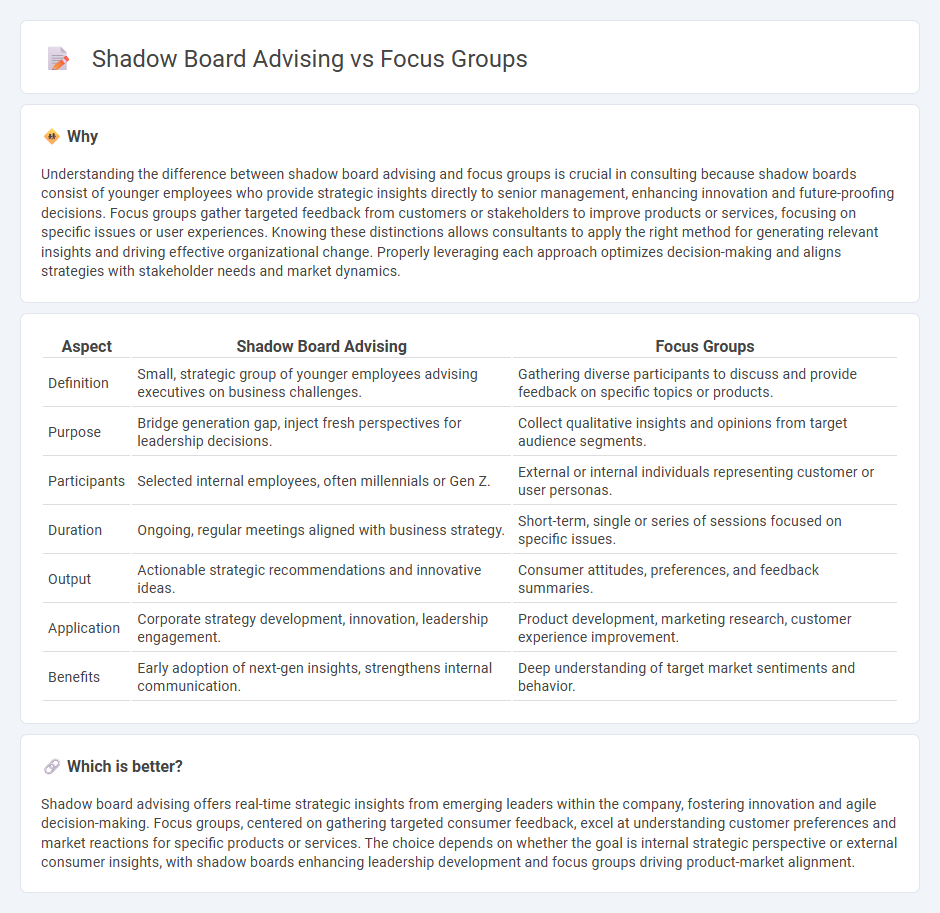
Shadow boards provide real-time strategic insights from younger employees, fostering innovation by integrating diverse perspectives directly into decision-making processes. Unlike focus groups, which gather feedback through structured discussions at specific intervals, shadow boards operate continuously within the organizational framework, enabling agile and informed consulting outcomes. Explore how shadow boards can revolutionize your consulting approach by bridging generational gaps and enhancing proactive strategy formation.
Why it is important
Understanding the difference between shadow board advising and focus groups is crucial in consulting because shadow boards consist of younger employees who provide strategic insights directly to senior management, enhancing innovation and future-proofing decisions. Focus groups gather targeted feedback from customers or stakeholders to improve products or services, focusing on specific issues or user experiences. Knowing these distinctions allows consultants to apply the right method for generating relevant insights and driving effective organizational change. Properly leveraging each approach optimizes decision-making and aligns strategies with stakeholder needs and market dynamics.
Comparison Table
| Aspect | Shadow Board Advising | Focus Groups |
|---|---|---|
| Definition | Small, strategic group of younger employees advising executives on business challenges. | Gathering diverse participants to discuss and provide feedback on specific topics or products. |
| Purpose | Bridge generation gap, inject fresh perspectives for leadership decisions. | Collect qualitative insights and opinions from target audience segments. |
| Participants | Selected internal employees, often millennials or Gen Z. | External or internal individuals representing customer or user personas. |
| Duration | Ongoing, regular meetings aligned with business strategy. | Short-term, single or series of sessions focused on specific issues. |
| Output | Actionable strategic recommendations and innovative ideas. | Consumer attitudes, preferences, and feedback summaries. |
| Application | Corporate strategy development, innovation, leadership engagement. | Product development, marketing research, customer experience improvement. |
| Benefits | Early adoption of next-gen insights, strengthens internal communication. | Deep understanding of target market sentiments and behavior. |
Which is better?
Shadow board advising offers real-time strategic insights from emerging leaders within the company, fostering innovation and agile decision-making. Focus groups, centered on gathering targeted consumer feedback, excel at understanding customer preferences and market reactions for specific products or services. The choice depends on whether the goal is internal strategic perspective or external consumer insights, with shadow boards enhancing leadership development and focus groups driving product-market alignment.
Connection
Shadow board advising involves a group of emerging leaders providing strategic insights, closely linked to focus groups through their use of diverse perspectives to inform decision-making. Focus groups gather targeted feedback from specific demographics, enabling shadow boards to incorporate real-time consumer opinions and employee experiences into organizational strategies. Both methods enhance consultative processes by fostering collaborative dialogue and refining business initiatives based on qualitative data analysis.
Key Terms
Qualitative Insights
Focus groups provide direct qualitative insights by engaging a diverse set of participants to discuss specific topics, capturing varied perceptions and emotional reactions. Shadow board advising involves a select group of younger or emerging employees offering innovative ideas and feedback, reflecting internal perspectives aligned with organizational culture. Explore the unique advantages of both methods to enhance your qualitative research strategies.
Generational Perspectives
Focus groups gather diverse generational opinions through structured discussions, capturing authentic experiential insights across age cohorts. Shadow boards, composed of younger employees, provide strategic advice to senior leadership, integrating fresh generational perspectives into decision-making. Explore how these methods uniquely influence organizational understanding of multigenerational dynamics.
Decision-Making Influence
Focus groups provide companies with diverse consumer insights through collective feedback, enabling improved product development and marketing strategies. Shadow boards consist of younger employees offering direct advice to executive teams, enhancing decision-making by integrating fresh perspectives from within the organization. Explore how these approaches uniquely impact corporate decision-making influence and drive innovation.
Source and External Links
What Is a Focus Group? Definition and Guide (2024) - Shopify - A focus group is a market research method where 6-10 people provide feedback on a product, service, or concept in a moderated, interactive session designed to uncover detailed consumer insights.
Spotlight on focus groups - PMC - Focus groups are a qualitative research technique involving guided, interactive discussions among a small group of people to explore attitudes and opinions on a specific topic, commonly used in marketing, social sciences, and healthcare.
Focus Group - Participedia - Focus groups gather participant opinions on a topic through moderated discussion, traditionally used in market research, policy-making, and public engagement to provide in-depth understanding of group perspectives.
 dowidth.com
dowidth.com